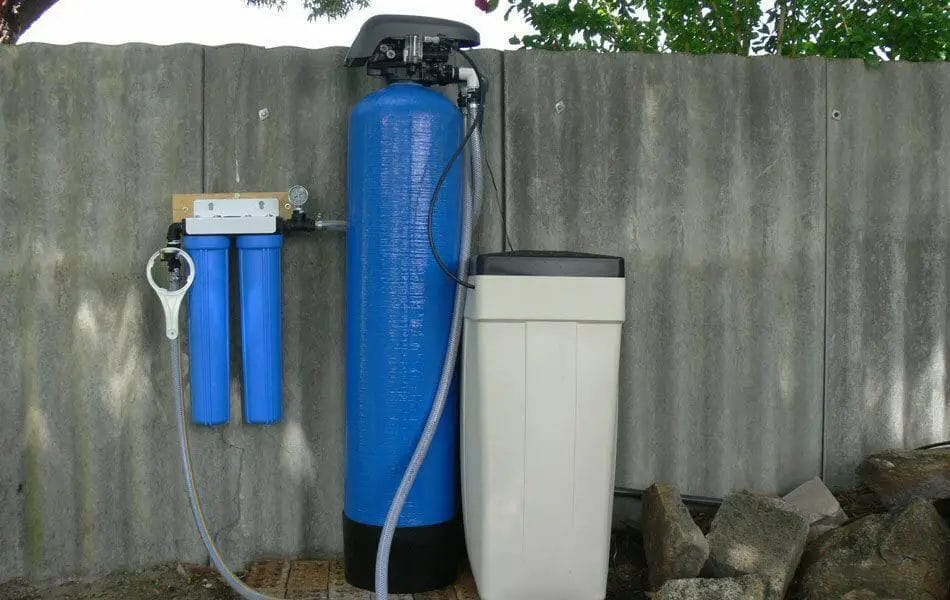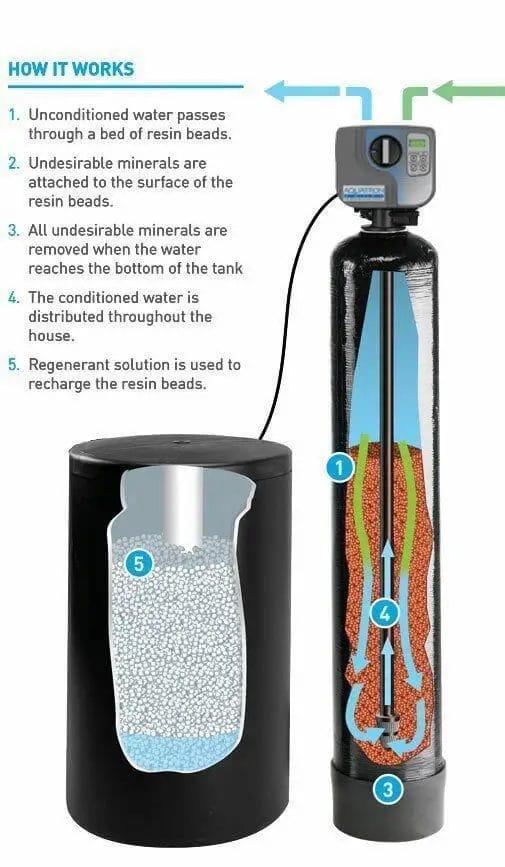Are you perpetually frustrated with hard water in your home and don’t know where to turn for an effective solution? You may have heard that water softeners can help, but you are unsure which type suits your needs.
Salt-based water softeners are the most traditional type of water softener, but more modern alternatives, such as salt-free systems, have become increasingly popular. But how do the two compare, and what should you consider when deciding which model is right for you?
It can be difficult to decide between a salt-based or salt-free water softener, as each has its own set of advantages and disadvantages. In this article, we will take an in-depth look at both options to help you determine which would be better. We will compare salt vs salt-free water softeners so that you can make an informed decision when choosing a unit to soften the water in your home. So, read on.
What Does Salt-Based Water Softener Mean?
A salt-based water softener is a device that uses a process called ion exchange to remove the minerals that cause hard water. Minerals can cause scale buildup and other problems in pipes and fixtures, including calcium and magnesium.
The salt-based softener passes the hard water through a tank filled with small resin beads. Due to their sodium charge, the beads attract calcium and magnesium ions in hard water. This process exchanges the sodium ions for the calcium and magnesium ions, leaving behind softened water.

The salt-based softener consists of two tanks: one containing the resin beads and another for storing brine solution. The brine solution is created by dissolving salt into the water. When it’s time to regenerate the resin beads, a metered valve on top of the tank will release some of this brine solution into the tank with the resin beads. This flushes out all of the calcium and magnesium ions collected over time, allowing them to be replaced with fresh sodium ions to continue softening your water supply.
What does Salt-Free Water Softener Mean?
Salt-free water softeners are an alternative to traditional salt-based systems. By crystallizing calcium and magnesium ions that cause scale to build up in plumbing systems, they condition the water instead of actually softening it. This is done with a single tank containing tiny pieces of potassium, which react with the hard water as it passes through. The result is that the calcium and magnesium particles are crystalized, preventing them from forming scale.

Salt-free water softeners are a great option for those who want to avoid using salt in their water treatment system. They are also more environmentally friendly than salt-based systems since they don’t require any additional chemicals or waste products.
Additionally, they require less maintenance than traditional systems since there is no need to add salt periodically. However, it should be noted that while salt-free water softeners can help reduce scale buildup in plumbing systems, they may not eliminate it.
Salt vs Salt Free Water Softener Comparison

According to the Water Quality Association, soft water is “any water which has been processed in some manner to reduce the total hardness.” It means removing calcium and magnesium from water to improve quality.
Soft water systems soften hard water, which often contains high levels of magnesium and calcium. So, if you notice stains or watermarks on your sinks and clothes, your water is hard. Hard water contains high levels of calcium and magnesium. A water softener offers better water quality.
Also, water softeners help increase the lifespan of the plumbing and appliances that function with water. Since hard water affects everything it comes across, water softening will also help your water usage.
Salt-water softeners turn “hard” water into “soft” water. It removes hard minerals from water through ion exchange, ridding the water of hardness minerals, and making soap challenging to lather.
So, ion exchange usually speaks of the water purification process using polymer resin, which discharges sodium particles in return for hard minerals. High-level hard water requires the use of salt softeners.
In contrast, salt-free water softeners do not soften water, as it does not purge hardness minerals from water. Instead, it retains these minerals in the water but converts them to another form, so they will not stick on surfaces.
The salt-free conditioner does not offer benefits like salt-based softeners do, though crystallizing calcium will reduce its buildup in pipes. Also, hardness crystals could revert in salt-free systems, forming scales on surfaces, and over time, there will be a buildup of hardness minerals in the water. More so, comparing salt-based water softeners vs. salt-free, only the salt-based softener offers softened water in the real sense.
Are Salt-Based Softeners Better than Salt Free?

When it comes to choosing between a salt-based softener and a salt-free water conditioner, there are pros and cons to each system. Salt-based systems use sodium chloride to remove minerals from the water, making it softer and more pleasant for bathing and washing clothes.
The downside is that these systems require regular maintenance and can be expensive over time. On the other hand, salt-free systems use an ion exchange process to reduce the number of minerals in the water without adding any chemicals or salts. This makes them more environmentally friendly, but they don’t soften the water as much as salt-based systems.
It comes down to personal preference when deciding which system is best for your home. If you want softer water with fewer minerals, then a salt-based system may be right for you. However, a salt-free system might be better suited for your needs if you’re looking for an eco-friendly option that reduces the mineral content in your water without adding any chemicals or salts. Whichever option you choose, research all your options thoroughly before making a decision so that you can find the best solution for your home.
Is Softened Water Unhealthy?
Softened water is healthy for the body. However, the decision to either drink it or not is based on whether you like the taste. Over the years, questions have been asked on how safe it is to drink softened water considering its amount of sodium. But, there has been no proof of how unsafe it may be. However, for health reasons, 200mg/l has been set as a limit on the recommended salt intake in water.
Frequently Asked Questions[FAQs]
1. What If Water Softener Runs Out of Salt?
A water softener should never run out of salt. If it does, it can halt ion exchange and allow hard water to flow through the pipes, harming the plumbing system and causing scale buildup. Scale buildup can reduce water flow and make water-using appliances burn more energy
2. What is Water Softener Salt?
Water softener salt is made of sodium and is similar to cooking salt. Sodium and potassium chloride are the two main types sold with water softeners.
3. Can I Put Bleach In My Water Softener?
Bleach should never be used on a water softener as it can interfere with the resin and completely ruin it. It is a harsh chemical that the manufacturer’s recommendation should only use, but it should not be used on a water softener.
4. Can I Install My Own Water Softener?
Yes. Installing a water softener will save you money and allow you to work at your pace. But make sure you know how to install one properly.
5. Can You Eat Water Softener Salt?
Yes. Water softener salt is safe for consumption. But, if you have health issues that require you to reduce your sodium and potassium intake, you should reconsider and consult your doctor.
Conclusion
Water softeners effectively remove hardness minerals like calcium and magnesium from water. Understanding salt vs. salt-free water softener comparison will help you choose the better two. However, salt water softeners are preferred to salt-free conditioners. They are effective in softening water and should be used if it contains a high hardness level. But, they are more expensive than salt-free conditioners and require regular maintenance. The choice is in your hands.
Sarah J. Gregory
352 Hershell Hollow Road
Anaheim, CA 92805






